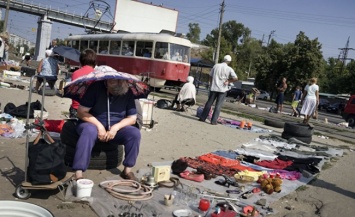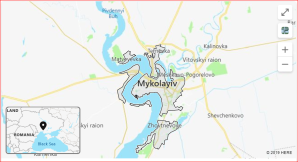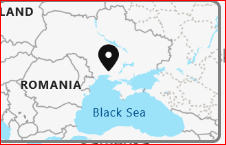Ukraine is a “U.S.-controlled aboriginal regime.”…Persons in place after 2014 “revolution” deliberately deindustrialized Ukraine following a pattern of former Soviet states in which “local big industries were destroyed as potentially pro-Russian.”…Ukraine’s supposed 2014 “revolution” consisted of a US puppet oligarch who allowed even worse corruption.
4/25/2018, “Ukraine is being deindustrialized according to Baltic scenario: opinion,” Eurasia Daily, Denis Gayevsky
.....
 [Image] “A swap meet in Kiev. Photo: inosmi.ru“
[Image] “A swap meet in Kiev. Photo: inosmi.ru““On Apr 24 [2018], the press service of Ukraine’s Justice Ministry reported that the building and the land of the Mykolaiv Shipyard will be put up for sale on May 21 [2018] because of wage arrears of 30.2mn UAH or $1.15mn.
The starting price is just 52.3mn UAH or $2mn – a tiny sum as compared with the sums the Kiev regime spends on its government staff and the army. In fact, this is the end of the history of Mykolaiv Shipyard. Established as long ago as 1787, that facility was stagnant during the years of independence. In 2014, it was denied financing and was unable to finish the Ukraine cruiser (now that ship will also be auctioned off even though in 2013, Russia offered as much as 1bn RUR for it). The beginning of the end came in autumn 2014, when the shipyard was converted into an enterprise producing small portable stoves for the Ukrainian army.
....
 [Image: Mykolaiv, Ukraine]
[Image: Mykolaiv, Ukraine] This seems to be part of the Kiev regime’s consistent policy to deindustrialize Ukraine, a policy that is aimed not only at turning Ukraine into a supplier of raw materials to foreign markets but also against Russia-oriented companies that may grow into a strong opposition and an active advocate of recovery of economic contacts with Russia. The paradox of this situation is that the Ukrainian comprador [local agent for foreign interests] elites are ruining their own economy just to be able to retain their power.
Their policy is not much contrary to public moods though: the last poll by the Rating Group has shown that 43% of the people living in Western and Central Ukraine believe that Ukraine should be a “big agrarian state.” This policy is being very actively implemented in the south of Ukraine, where former Communist industries are being decimated (Odessa Port Plant, Zorya-Mashproekt, Odessa Oil Refinery, a number of ship yards), while grain handling and plant growing businesses are thriving – and the key actors there are western and transnational corporations like Bunge and Cargill.
[Image: Area of Mykolaiv, Ukraine closed shipyard]
As far as economic neoliberalism is concerned, Ukraine is actually being reformed: attractive sectors are being given to western capitals, while lots of Ukrainian workers are emigrating to Europe to the benefit of the Ukrainian government, who no longer needs to support them, and the European governments, who are receiving cheap labor force.
Similar processes took place in the Baltic states after the collapse of the Soviet Union: all of the local big industries were destroyed as potentially pro-Russian: most of the people working there were Russians or Russian-speaking Balts and were regarded as a potential threat to the local regimes. Latvia and Estonia turned them into non-citizens lest they might form trade unions and self-organize into political and civil rights movements. Today the Baltic regimes are exclusively rightwing.
For many years, they have been sharing their experience with their Ukrainian colleagues, so, it is not a surprise that the Kiev regime is acting likewise.
Ukraine will continue moving in this direction unless new, more pragmatic forces come into power as a result of the next year’s parliamentary and presidential elections. But those forces may face the Lithuanian scenario of 2003-2005, when the Lithuanians expelled pro-Russian pragmatics like Rolandas Paksas and Viktor Uspaskikh.”
Denis Gayevsky, Kiev
.............


No comments:
Post a Comment